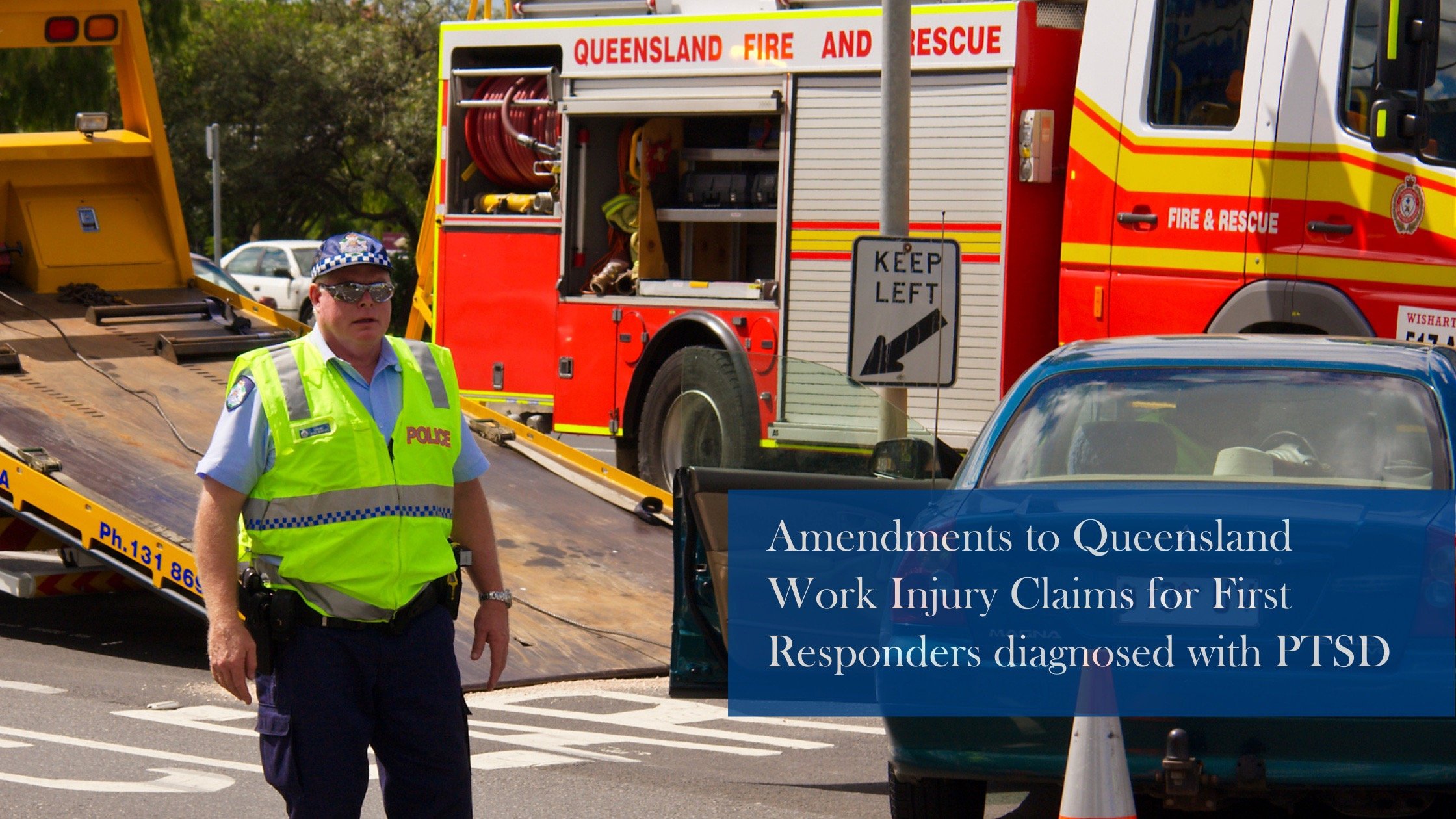Queensland’s Presumptive Legislation Amendments
Changes came into effect recently in Queensland for work-related statutory claims made by ‘first responders and eligible employees’ who have been diagnosed with PTSD.
Given the nature and serious impact of Post-Traumatic Stress Disorders (‘PTSD’), the amendments allow an injured worker to make a statutory compensation claim with WorkCover Queensland or the relevant self- insurer (‘the Insurer’) much faster and easier than they were able to before. This streamlined process also means that the injured person can make a claim for the assistance and compensation they need and deserve without having to revisit the incident/s that caused the trauma.
What are the changes?
The amendments insert presumptive provisions into the Workers’ Compensation & Rehabilitation Act 2003 (‘WCRA’) and the Workers’ Compensation & Rehabilitation Regulation 2014 (‘WCRR’), changing the way in which the Insurer will consider certain applications for a diagnosed PTSD injury.
Employees who satisfy the definition of ‘first responder or eligible employee’ will now be presumed to have a work-related psychiatric injury.
From a legal perspective, these changes switch the “burden of proof” for these eligible work categories who have PTSD, meaning that it is now the responsibility of the Insurer to prove that the PTSD is not work- related should it be suspected as such. It is important to emphasise here that your PTSD must still have occurred as a result of your work, but the presumptive amendments mean that you are not required to prove this but instead the Insurer must disprove it by obtaining medical or employment record evidence.
Am I eligible as a ‘first responder’ or ‘eligible employee’?
The definition of who is a ‘first responder or eligible employee’ is outlined within Schedules 6A and 6B the amended WCRR, but includes:
Firefighters (including rural and volunteer);
Police officers and police recruits;
Queensland ambulance officers;
Corrective service officers;
Child protection officers and youth justice staffers;
State Emergency Service (‘SES’) members;
Medical and nursing staff in high demand acute and emergency care scenarios; and
Coal miners and other miners who perform rescue activities as part of their employment duties.
In addition to meeting the employment requirement and diagnosis of PTSD, the injured person must also meet particular requirements in relation to the duties of their employment and the impact of life- threatening or traumatic incidents. In particular:
For ‘first responders’ – “the person’s employment requires the person to respond to incidents that are life-threatening or otherwise traumatic and for which time may be critical to prevent actual or potential death or injury to persons, or to prevent or minimise damage to property or the environment.”
For ‘eligible employees’ – “the person’s employment requires the person to experience repeated or extreme exposure to the graphic details of traumatic incidents by attending the scenes of traumatic incidents or experiencing traumatic incidents as they happen to other persons or investigating, reviewing, or assessing traumatic incidents that have happened to other persons”.
Should you consider yourself to be eligible and decide to lodge a claim, then the changes effectively mean that your PTSD injury and work connection are presumed on the basis of your employment. If the Insurer needs further information to satisfy itself that you meet the other requirements as above, then it will obtain this information before accepting or rejecting your claim.
Who is required to diagnose my PTSD?
Your PTSD must be diagnosed by a registered psychiatrist, and this diagnosis must have been made either during or after your employment as a ‘first responder’ or ‘eligible employee’.
WorkCover Queensland has provided some additional guidance for those who have not met this requirement but have been advised by a General Practitioner of the diagnosis of PTSD. In these circumstances, you should lodge your claim as the Insurer will assist financially and logistically for the injured worker to see a psychiatrist for clinical diagnosis.
How and when should I make a claim?
All workers in Queensland have a right to make a claim for statutory benefits for work-related injuries, and this starts with making an application to WorkCover Queensland or the registered self-insurer. The application must be made within 6 months from an entitlement to compensation.
In circumstances of an injured ‘first responder or eligible employee’ under the amended legislation, your application must be made within 6 months from the date of PTSD diagnosis.
Our lawyers are experts in workers’ compensation cases and can provide you with the advice you need as to your rights following a workplace or work-related injury.
